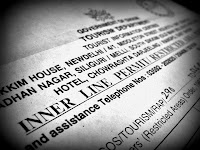New Delhi, Aug 20 : The government has created separate cadres of Manipur and Tripura for IAS, IPS and IFoS officers.
Earlier, Manipur-Tripura acted as a joint cadre for officers of all India services (AIS)--Indian Administrative Service (IAS), Indian Police Service (IPS) and Indian Forest Service (IFoS).
The Department of Personnel and Training (DoPT) has also come out with a draft list of allocation of separate cadres of Manipur and Tripura to these officers.
The move comes following a recommendation from a committee headed by DoPT Secretary.
"It is recommended that the AIS officers would be allocated or distributed on the principle of 'as is where is' basis, which means that the determinant factor would be the current posting of the officers.
"In case of those officers who are not in the cadre right now, the determinant factor would be their last place of posting in the joint cadre of Manipur-Tripura," the Committee has said.
As per the draft distribution list, 91 IAS, 60 IPS, 44 IFoS officers (including promotees) are to be allocated to Manipur. Likewise, 73 IAS, 50 IPS and 57 IFoS officers (including promotees) are to be allocated to Tripura, the DoPT order said.
The Committee, which was formed after the passing of the North Eastern Areas (Reorganization) Amendment Act, 2012, had as members Chief Secretaries of Manipur, Tripura, Special Secretary (Internal Security), Ministry of Home Affairs, Inspector General (Forest-cum-Special Secretary), Ministry of Environment and Forests and Joint Secretary in the DoPT.
"Any factual error in the distribution or any representation may please be brought to the notice of Department of Personnel and Training latest by August 25, 2014," it said.
Earlier, Manipur-Tripura acted as a joint cadre for officers of all India services (AIS)--Indian Administrative Service (IAS), Indian Police Service (IPS) and Indian Forest Service (IFoS).
The Department of Personnel and Training (DoPT) has also come out with a draft list of allocation of separate cadres of Manipur and Tripura to these officers.
The move comes following a recommendation from a committee headed by DoPT Secretary.
"It is recommended that the AIS officers would be allocated or distributed on the principle of 'as is where is' basis, which means that the determinant factor would be the current posting of the officers.
"In case of those officers who are not in the cadre right now, the determinant factor would be their last place of posting in the joint cadre of Manipur-Tripura," the Committee has said.
As per the draft distribution list, 91 IAS, 60 IPS, 44 IFoS officers (including promotees) are to be allocated to Manipur. Likewise, 73 IAS, 50 IPS and 57 IFoS officers (including promotees) are to be allocated to Tripura, the DoPT order said.
The Committee, which was formed after the passing of the North Eastern Areas (Reorganization) Amendment Act, 2012, had as members Chief Secretaries of Manipur, Tripura, Special Secretary (Internal Security), Ministry of Home Affairs, Inspector General (Forest-cum-Special Secretary), Ministry of Environment and Forests and Joint Secretary in the DoPT.
"Any factual error in the distribution or any representation may please be brought to the notice of Department of Personnel and Training latest by August 25, 2014," it said.













